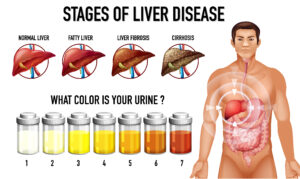
Your liver is one of the most important organs in your body. It filters toxins, breaks down fats, processes nutrients, and supports your immune system. But when your liver starts to struggle, the signs are not always obvious. Ignoring early symptoms of liver problems can lead to serious health issues down the line. In this blog, we’ll walk you through the early signs of liver problems, the importance of spotting them in time, and what you can do to protect your liver.
If you notice any of the signs below, it may be time to consult a liver specialist. Many people find relief and effective treatment by seeing experts listed among the top 10 gastroenterologist in Surat who are trained to handle liver-related conditions with advanced care.
🚨 Why Liver Health Matters
Your liver plays over 500 essential roles in the body — from producing bile for digestion to storing vitamins and detoxifying harmful substances. When it’s not functioning properly, other organs and systems are affected. Liver issues can start silently and progress slowly, so knowing what to look for is key to protecting your long-term health.
⚠️ Early Signs of Liver Problems You Should Never Ignore
Below are some of the most common early symptoms of liver disease. These signs often seem minor at first but can indicate a deeper issue when they persist.
1. Fatigue and Weakness
Feeling tired all the time, even after proper sleep? Chronic fatigue is one of the earliest and most common signs of liver trouble. When your liver isn’t able to properly process nutrients and filter waste, your body slows down.
2. Yellowing of the Skin or Eyes (Jaundice)
Jaundice occurs when there’s a buildup of bilirubin, a yellow pigment created when red blood cells break down. A healthy liver removes bilirubin from the blood. But when the liver is damaged, it can’t filter this substance effectively — leading to yellowing skin and eyes.
3. Dark-Colored Urine
If your urine is darker than usual (like cola or tea), especially when you’re well-hydrated, it could mean excess bilirubin in your bloodstream. This can be an early sign of liver dysfunction.
4. Abdominal Discomfort or Swelling
A heavy or aching feeling in the upper right part of your abdomen — where the liver is located — could indicate inflammation. In more advanced cases, fluid buildup (ascites) may cause the belly to look swollen.
5. Nausea and Vomiting
Your liver helps remove toxins from your digestive system. When it’s not working properly, toxins can build up and lead to frequent nausea or vomiting, especially after meals.
6. Loss of Appetite
If you’ve been losing interest in food and experiencing unexplained weight loss, it may be a signal that your liver is under stress. This often occurs in liver disease as your body struggles to process nutrients.
7. Itchy Skin
When bile salts build up in the body due to liver dysfunction, they can cause persistent itching, especially on the hands and feet. If you’ve ruled out allergies and still itch regularly, your liver might be the culprit.
8. Swelling in the Legs and Ankles
Poor liver function can disrupt blood flow and cause fluid retention, leading to swelling in the lower extremities. Unlike simple water retention, liver-related swelling may not go away easily.
9. Pale or Clay-Colored Stool
A healthy liver produces bile, which gives stool its brown color. If your liver isn’t making enough bile or it’s blocked, your stool may appear pale or greyish — an early sign of liver dysfunction.
10. Easy Bruising or Bleeding
Your liver produces proteins that help your blood clot. When it’s damaged, you may bruise or bleed more easily, even from small injuries or nosebleeds.
🛑 What Causes Liver Damage?
Some common causes of liver problems include:
- Fatty Liver Disease (due to obesity or poor diet)
- Hepatitis infections (A, B, C)
- Alcohol abuse
- High cholesterol and diabetes
- Toxic medications or supplements
- Genetic liver disorders
✅ How to Protect Your Liver
Taking steps early can help prevent long-term liver damage. Here’s what you can do:
- Eat a balanced diet rich in fruits, vegetables, and whole grains.
- Limit alcohol intake or avoid it completely.
- Exercise regularly to maintain a healthy weight.
- Avoid unnecessary medications or supplements without a doctor’s advice.
- Get vaccinated against hepatitis A and B.
- Schedule regular checkups and liver function tests if you’re at risk.
👨⚕️ When to See a Doctor
If you’re experiencing two or more of the above symptoms for more than a few days, it’s important to see a liver specialist. They can perform blood tests, imaging (like ultrasound or CT scan), and other evaluations to determine the condition of your liver.
Early detection gives you the best chance to reverse liver damage and avoid serious complications like cirrhosis or liver failure.
🔍 Final Thoughts
Your liver may be silently working 24/7, but when something goes wrong, your body often tries to signal you. Pay attention to these early signs and never ignore them. Simple actions and awareness today can protect your liver — and your life — tomorrow.
Whether you need expert diagnosis or a long-term liver care plan, the top 10 gastroenterologist in Surat offer the guidance and support you need. Make your health a priority — your liver will thank you.
